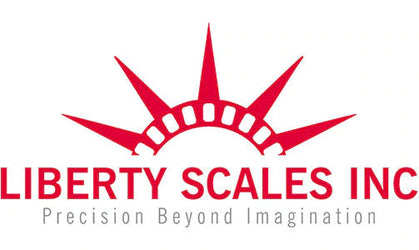Liberty Scales is offering its Legal For Trade load cells (NTEP Approved). If you are using an NTEP floor scale, you must use this type of load cell for the scale to be NTEP approved.
- 1000 lbs x .2 lb
- 2500 lbs x .5 lb
- 5000 lbs x 1 lb
- 10,000 lbs x 2 lb
Features:
- Shear beam load cells, one end fixed.
- Alloy steel or Stainless Steel Option
- Self-centering
- Easy to install & use
- Shear Beam Single-Ended Load Cell
Specifications:
- Rated Output (mV/V): 3.00±0.015
- Nonlinearity: ±0.02%FS
- Hysteresis: ±0.02%FS
- Repeatability: ±0.01%FS
- Creep (30 minutes): ±0.02%FS
- Zero Balance: ±1.00%FS
- Temperature Effect on Zero: ±0.02%FS/10°C
- Temperature Effect on Output: ±0.02%FS/10°C
- Input Resistance: 385±5Ω
- Output Resistance: 350±3Ω
- Insulation Resistance: ≥5000MΩ
- Excitation Voltage: 10V(DC/AC)
- Compensated Temperature Range: -10°C ~ 50°C
- Operating Temperature Range: -20°C ~ 60°C
- Safe Overload: 120%FS
- Cable: 5.4x6 m
Frequently Asked Questions About Our Load Cell Sensor for Weight Measurement
Our shear beam load cell sensors are made to sort all your weighing needs in the most convenient way possible. If you have an existing platform floor scale, then this load cells weight sensor will be the perfect companion.
Here, we'll talk about our shear beam load cell weight sensors, which come with feet and spacers that can make your experience much better.
As mentioned, the beam load cell is among the most common types used in weighing technology. These load cells flex when they're subjected to weight.
When talking about beam load cells, we can expect two subcategories, bending and shear beam cells. The latter, which is the one we're offering, is meant to measure shear distortion.
Overall, these products are a transducer or force sensor that converts the weight into an electrical signal through strain gauges. When you apply a load to the body load cell weight sensor, it will flex, and the strain gauge will compress or stretch with it. The process will change the item's electrical resistance, which will change the output voltage.
The change in output signal will be proportional to the initial weight of the item, and you'll be able to calculate it.
In essence, these load cells are perfect for a wide range of weighing applications, especially if you're dealing with larger capacities. Depending on your needs, you can use them for platform scales, weighing tanks, and even building multi-sensor scales.
Beam load cells are among the most commonly used options in the weighing world. Load cells, in general, are classified into many different types, depending on the application.
The classification of load cells can be a bit tricky to understand at first, so we'll give you an easy overview to get started.
You can separate the load cells/force sensors into three main categories:
- Mechanical Force Sensors
- Strain Gage Load Cells
- Others (Helical, Fiber Optic, and Piezo-resistive cells)
If you're looking for mechanical force sensors, for example, you can expect hydraulic load cells or pneumatic load cells. On the other hand, if you have strain gage sensors, you would be getting:
- Bending Beam Load Cells
- Shear Beam Load Cells
- Canister Load Cells
- Button and Washer Force Sensors
- Ring and Pancake Load Cells
Finally, if you get beam load cells or single-point load cells, for example, you can sub-divide them into a:
- Tension Load Cell
- Compression Load Cell
- Alternating Load Cell
- Bending Load Cell
Absolutely! These load cells were designed to be durable and easy to install. If you're looking for a variety of applications, such as floor scales or hoppers, then this product may be excellent.
Another factor that makes these load cell sensors special is that they're NTEP-approved. This means that, if you're working with an NTEP floor scale, you should get them.
The NTEP (also known as the National Type Evaluation Program), is a non-profit corporation that aims to ensure that several weighing systems in the US are tested to ensure they meet government standards.
In most cases, your scale needs to be NTEP-approved, and the best thing you can do is get the weight sensors we're offering here, as they're already tested, evaluated, and approved.
Depending on your needs and budget, you can choose alloy or stainless steel for your load cells. Stainless steel tends to be a much better choice if you're looking for sturdiness, whereas alloy is better if you're looking for compact measurements.
Another factor is the price. Alloy load cells are much more affordable than stainless steel ones.
Before you decide on the materials, make sure you think about what's best based on:
- Purpose
- Pricing
- Operating Conditions
- Location
- Free Shipping: Available across 48 continental USA. Extra charges may apply for residential, farm, or rural areas.
- Express Shipping: Overnight and faster shipping options available at additional costs. Quotes obtainable via email.
- Delivery Time: Typically 5 to 7 business days, varying by location and external conditions.
- Tracking Information: Provided via email upon shipment. Accessible through account login. Additional information available upon request.
- Return Policy: 15-day return period for unused, original condition products. A 25% restocking fee applies. Buyer covers original and return shipping costs.
- Customer Support: Contact at (661) 888-1919 or sales@libertyscales.com for queries or concerns about shipping.













